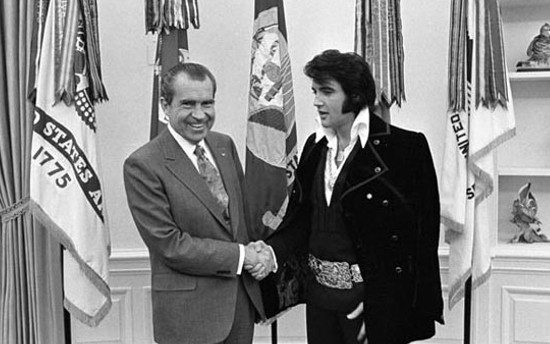I’ve written many times here about Peter’s vision of the treyf smorgasbord in the book of Acts (most recently here, and earlier here).
I love that story, which is why I’ve linked to those chapters from Acts, reprinted them here, and summarized them many times. It’s a terrific story from the Christian Bible and I want everyone to read the whole thing. For some reason, that leads my conservative friends to accuse me of desperately wanting to hide this story and to prevent people from reading it. Please go read it.
(Seriously, click the link there with the words “go read it.” Or click this link here. Read it. Read what it actually says rather than just what these alleged “conservatives” pretend it says. Go read it.)
Part of my fascination with that story, yet again, is that so many modern American readers of it insist that the apostle Peter was some kind of disobedient jerk who could not be trusted to report honestly on the meaning of the vision that God gave to him alone and that he alone witnessed. …
They don’t say this explicitly, in exactly those words. But they want to tell you what Peter’s vision means. And what they tell you it means is not at all the same thing as what Peter himself said it means and what Peter himself showed it to mean.
Don’t listen to Peter, they argue — Peter cannot be trusted to tell us what Peter’s vision means. And don’t listen to Luke. Both of them pervert the obvious meaning of Peter’s vision, refusing to stick with the obvious literal interpretation of this divine revelation.
So, OK, here, for the um-tiddly-umpteenth time, is Peter’s vision as described in Acts 10:11-16, quoted here in the approved conservative formulation that surgically segregates those five verses from the whole story as told in Acts 10:1 through Acts 11:18 in which it reinforces the themes, also, of the larger story told in Acts 1:1 through Acts 28:31, inclusive:
He saw the heaven opened and something like a large sheet coming down, being lowered to the ground by its four corners. In it were all kinds of four-footed creatures and reptiles and birds of the air. Then he heard a voice saying, ‘Get up, Peter; kill and eat.’ But Peter said, ‘By no means, Lord; for I have never eaten anything that is profane or unclean.’ The voice said to him again, a second time, ‘What God has made clean, you must not call profane.’ This happened three times, and the thing was suddenly taken up to heaven.
This vision, Team Mohler says, correctly, is very specific. It’s about food and diet and doesn’t mention anything else — nothing about sexuality or gender or ethnicity or liberation or Jubilee or reconciliation. God speaks in the imperative and God’s words are clear, direct and specific: “Kill and eat.” This imperative applies specifically to that which is shown in the vision, to “all kinds of four-footed creatures and reptiles and birds of the air.”
The voice of God speaks in this vision and Team Mohler notes that the voice of God is unambiguous and explicit. We have a verbatim quote from God: “What God has made clean, you must not call profane.”
That’s God Almighty talking there. God Almighty, the source of this vision, explicitly states the meaning of the vision and sets a clear, unambiguous boundary on that meaning. To miss that point or to try to change God’s words would be to contradict the explicit, verbatim words of God Almighty.
That’s a powerful argument there from Team Mohler. Seems conclusive. They’ve cited chapter and verse and the authority of the very words of very God.
And yet some of us — obstinately — refuse to accept that this is all that this vision meant or all that it means or ought to mean. Worse than that, some of us who insist that this vision meant something more than that have the audacity to put other words into the mouth of God. We insist on changing the words that God Almighty spoke to Peter and, thereby, vastly altering and expanding the meaning of this revelation.
Let me note yet again that this vast alteration of the explicit words of God wasn’t my idea. If you want to blame someone here for changing the words and misquoting Almighty God, blame Peter and Luke. They started it.
They started it almost instantaneously, seconds after Peter received the vision, with the explicit words of God still ringing in his ears. In that instant, Luke writes, Peter reveals the confusion that would lead to his changing the words God spoke. Here is the very next verse: “Now while Peter was greatly puzzled about what to make of the vision that he had seen …”
What is that all about? How could he possibly be “puzzled”? How could Peter fail to understand the very explicit meaning of what he had just seen, of what he had just heard God Almighty say, verbatim, three times?
This puzzlement separates Peter from Team Mohler. Mohler et. al. read the account of Peter’s vision in Acts 10:11:16 and they are not puzzled at all. They know exactly what it means and what it doesn’t mean and don’t see any basis for Peter’s confusion. It’s obvious. It’s clear. God spoke and all we have to do to understand is to listen to the literal words that God literally said: “What God has made clean, you must not call profane.” The “four-footed creatures and reptiles and birds of the air” that had previously been forbidden as un-kosher were now fair game.
But the apostle Peter doesn’t listen to those verbatim words from God. Instead he listened to something else — to the knocking at his door. That knocking heralds the arrival of the two-footed, warm-blooded, un-feathered gentile servants from the household of the Roman centurion Cornelius. With the arrival of these visitors Peter arrives at a new conclusion about the meaning of his vision. He arrives at a conclusion that Team Mohler insists is the wrong conclusion — one that contradicts and changes the very words God Almighty has just spoken to him.
And make no mistake about it, Peter does exactly that. He changes the words. He misquotes God. “What God has made clean, you must not call profane,” God said. God said it, Team Mohler believes it, and that settles it. But Peter unsettles things by changing those words, saying instead that, “God has shown me that I should not call anyone profane or unclean.”
That’s not what God said. God didn’t say “who,” God said “what.” God was talking about “all kinds of four-footed creatures and reptiles and birds of the air,” and saying that un-kosher food is no longer forbidden. Peter’s formulation is radically different — it’s sweeping and universal in scope, going far beyond what God actually said in the vision. “God has shown me that I should not call anyone profane or unclean.”
Rebellion. Sin. Apostasy. Peter is putting words into the mouth of God. New words, different words, incompatible words that directly contradict what God Almighty had said, verbatim, just a few verses earlier.
To make matters worse, Luke plays along with Peter’s alteration of the words of God. The following chapters of Acts treat Peter’s perverse paraphrase of the words of God as authoritative, denying and defying the clearer, more obvious, less expansive literal meaning of the words God spoke.
This rewriting of divine revelation, this putting strange new words into the mouth of God Almighty is, alas, not unique to Peter and Luke. It happens all over the place in the Bible.
Isaiah did the same thing Peter did. It’s an even more egregious case, actually.
In Isaiah 58, the prophet directly contradicts and alters the clear and unambiguous words of God as revealed in the books of Moses. God ordained and commanded feast days. God decreed particular sacrifices and offerings. These were not optional. This was the word of God Almighty.
But not only does Isaiah dismiss those explicit, verbatim words of God, he has the gall, like Peter, to put new words into the mouth of God. Isaiah brazenly interprets his own vision from God as a contradiction of what is clearly and explicitly established as God’s will. It’s not just that Isaiah makes God ridicule and dismiss those earlier divine statements about feast days, fast days and sacrifices, he also puts words in the mouth of God that deal with a much larger subject. Isaiah 58 changes what God had to say about the singular theological question that has shaped American history, American culture and American Christianity more than any other theological question: the matter of slavery.
The laws of Moses did not condemn slavery. The laws of Moses permitted, regulated and condoned slavery. In the books of Moses, the people of God were sometimes commanded to take slaves and to keep slaves and to punish slaves. Abraham, a righteous man blessed by God, owned slaves. Abraham’s owning of slaves did not adversely affect his standing with God as a righteous man or cause him to lose God’s blessing. On the contrary — Abraham’s owning of slaves is portrayed in the books of Moses as a sign of God’s blessing. We know that Abraham and others were righteous and blessed, in part, because they owned so many slaves.
That’s in the Bible. That’s canon.
And yet here comes Isaiah to turn all of that upside-down. Here comes Isaiah to put new words into the very mouth of very God — words that contradict the canonical words God spoke to Abraham and to Moses. Here comes Isaiah, like Peter, to suggest that the clearest, most straightforward and literal obvious meaning of those words of God is wrong — that the literal face-value meaning of those words is inadequate, that it’s not nearly big enough or expansive enough or inclusive enough.
Rebellion. Sin. Apostasy, etc.
Is not this the fast that I choose:
to loose the bonds of injustice,
to undo the thongs of the yoke,
to let the oppressed go free,
and to break every yoke?
That’s in the Bible too. That’s also canon.
So here we are: Scripture vs. scripture, the Bible vs. the Bible. How are we to make sense of this?
That’s a difficult problem for any subject in any context. But we’re not talking about just any subject or just any context — we’re talking about the subject of slavery in the context of America. And that takes things to a whole other level.
The question of slavery was the foremost theological controversy in America in the 19th century, but it was never simply an abstract question for scholars in ivory towers to debate abstractly and disinterestedly. There was way too much money at stake for that.
It may seem crass to suggest that any amount of money at stake would influence a theological dispute or the way that Christians relate to and interpret the Bible, but you really need to appreciate the amount of money we’re talking about here.
No, no, no — much more money than that.
I’m not sure how much money you were thinking about when you read that phrase “too much money at stake,” but you’re underestimating the sheer, vast, mind-boggling size of the pile of money at stake in this dispute. Whatever amount you were imagining, the amount of money at stake in this controversy is bigger than that — even if you’re taking into account that the amount is bigger than what you’re imagining. Here’s Yale historian David Blight:
By 1860 there were approximately 4,000,000 slaves in the United States, the second largest slave society — slave population — in the world. The only one larger was Russian serfdom. … In 1860 slaves as an asset were worth more than all of America’s manufacturing, all of the railroads, all of the productive capacity of the United States put together. Slaves were the single largest, by far, financial asset of property in the entire American economy. The only thing worth more than the slaves in the American economy of the 1850s was the land itself, and no one can really put a dollar value on all of the land of North America.
So it’s hard to imagine that the pro-slavery side of America’s epic theological dispute over slavery could have been wholly disinterested.
And the anti-slavery side, of course, wasn’t disinterested either. Frederick Douglass, for example, never even tried to approach the theological and hermeneutical controversy over slavery from a vantage point of impartial abstraction. His personal interest in the controversy was unquantifiable — it was priceless.
So both sides had more at stake than can be easily imagined and the theological battle-lines were drawn.
On the one side were the ancestors — in every sense — of Team Mohler. They defended slavery by citing chapter and verse from the Bible and by arguing that this is how the Bible must always be read and understood, by citing chapter and verse. They listed dozens of biblical passages that unambiguously permitted, condoned or commanded slavery. Such passages, they said, must be interpreted literally. That was the only acceptable way to read the very words of very God. “Literal” became a rallying cry, a battle cry that shaped one faction’s theology throughout the 19th century and, thereafter, on through the 20th century and into the 21st.
But the other side quoted the Bible, too. They had a few passages, such as that chapter of Isaiah, that were no less explicit and unambiguous in condemning slavery. But this side didn’t rest its case on a literal reading of those literal words. Instead, they stepped back to look at the bigger picture, at the trajectory of the Bible, at the character of God portrayed in that Bible and the characteristics it taught for any people who sought to be God’s children. They sometimes cited chapter and verse, but they also sought to put verses into the context of chapters, and chapters into the context of books, and books into the context of a larger whole. For them the big picture was clear, and no single chapter-and-verse data point from one location along the grand trajectory could rightly be interpreted — “literally” or otherwise — as contradicting the clear meaning and direction of the whole.
So who won this theological argument? In a sense, the big-picture people did, but they didn’t really win on theological grounds. They argued that their hermeneutic was more consistent and more respectful of the whole of scripture, but that contention didn’t turn out to matter quite as much for the outcome of this debate as did, say, Gen. Sherman’s burning of Atlanta. They came out on top in the theological dispute because they were aligned with the side that came out on top in the Civil War.
Before that war, slavery had also been the subject of a fierce secular controversy over the meaning of the text of the U.S. Constitution. That conflict precisely mirrored the ongoing theological dispute. On the one hand there was the pro-slavery side, arguing for a literal interpretation of the literal text. And on the other hand was the anti-slavery side arguing for a big-picture consideration of that text’s larger trajectory. Victory in the war allowed the anti-slavery faction to settle that matter by subsequently rewriting the Constitution to include the revolutionary 13th, 14th and 15th Amendments. The dispute over the interpretation of the text of the Constitution thus was resolved — in theory — by amending the text to make it support the winning side.
Alas, this textual dispute settled by the lethal violence of war was quickly unsettled by the lethal violence of terrorism, with mass killings, night riders, lynchings and mob rule rendering the text itself — literal or otherwise — largely irrelevant throughout most of the country for a century afterward.
It may seem like I’ve drifted far, far afield from my original subject. I started out by discussing Peter’s vision in Acts 10 and somehow I’ve wound up at the Colfax Massacre.
Well, yeah. Because it’s all the same subject. The question I’m exploring about Peter’s vision is how we go about understanding what that vision means. Can we accept Peter’s interpretation of it, even though that requires us to change the literal words that God spoke to him? And there — at the intersection of biblical literalism and meaning — I as an American must also come inevitably and inexorably to Colfax and terrorism and the Klan and all the cruel violence of a history shaped by slavery.
These things are inseparable here in America. Here the claim of a “literal interpretation of scripture” is bound up, warp and woof, with the central, defining American dispute over slavery. American biblical literalism arose to prominence in defense of slavery and has shaped itself for centuries in pursuit of that one contention. American biblical literalism retains that same shape today, even when it is applied to diverse other subjects, from sexuality to origins to eschatology.
American biblical literalism has not changed. It preserves its essential fear of and antipathy toward any consideration of the bigger picture or the larger trajectory. It reflects its instinctual sympathy for siding with the deepest pockets. It reflexively strikes back against any hint of liberation or of Isaiah’s redefinition of Jubilee.
If you really want to understand Team Mohler, you have to appreciate that it is the heir to, and the latest incarnation of, Team Calhoun.
Read the whole post here.





 For an illustration of how this confusion begets further confusion, consider the recent news from
For an illustration of how this confusion begets further confusion, consider the recent news from 









